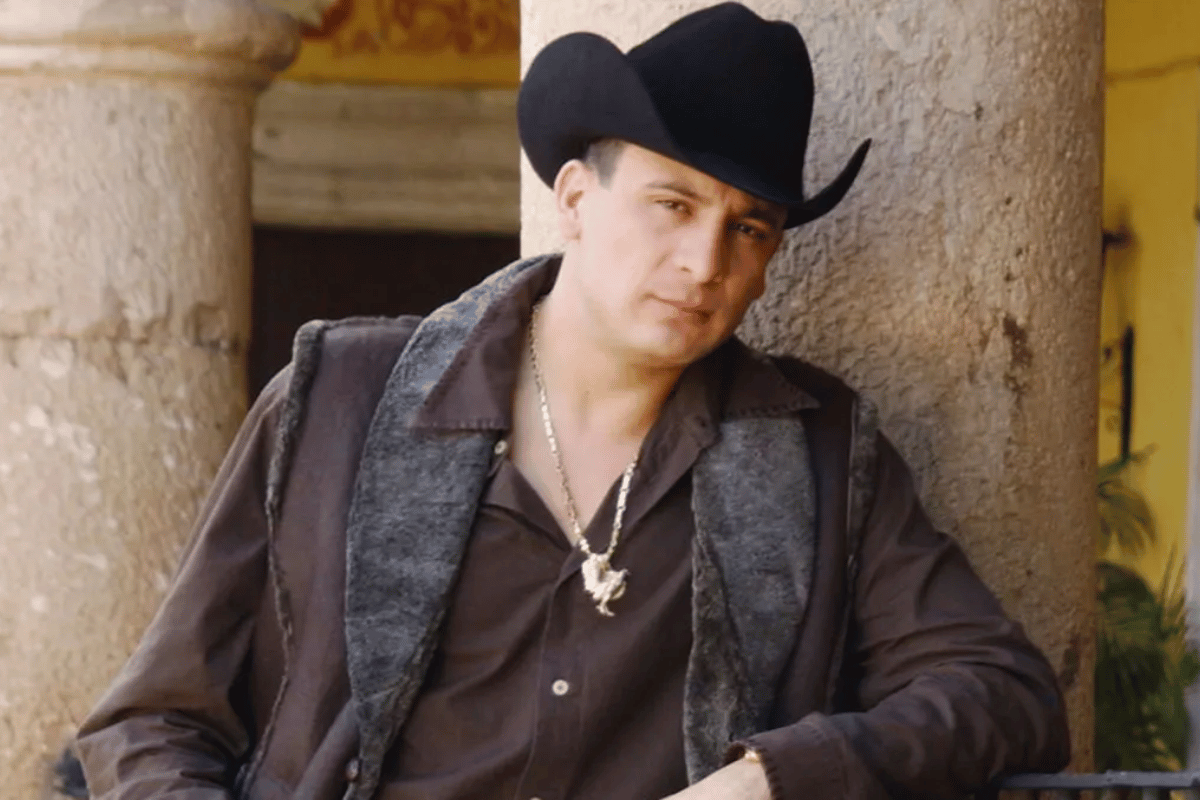Valentin Elizalde's Tragic End: Unraveling The Date And Legacy
The world of regional Mexican music was plunged into profound grief and shock on a fateful day in late 2006, when one of its brightest stars was brutally taken. For years, fans and newcomers alike have sought to understand the circumstances surrounding this tragedy, often asking the poignant question: when did Valentin Elizalde die? His untimely passing left an indelible mark on the music industry and on the hearts of millions, transforming him from a rising icon into an enduring legend whose voice continues to resonate across generations.
Valentin Elizalde, affectionately known as "El Gallo de Oro" (The Golden Rooster), was more than just a singer; he was a cultural phenomenon whose charismatic stage presence and heartfelt lyrics captured the essence of Mexican life and emotion. His music, a vibrant blend of banda, norteño, and mariachi, spoke to the common person, chronicling tales of love, heartbreak, and the harsh realities of life. The abrupt end to his promising career ignited a wave of sorrow and speculation, ensuring that the date of his death would forever be etched in the collective memory of his admirers.
Table of Contents
Biography of Valentin Elizalde
Valentin Elizalde Valencia was born on February 5, 1979, in Jitonhueca, Sonora, Mexico. From a young age, he was immersed in the world of music, largely influenced by his father, Everardo Elizalde, who was also a singer. This early exposure to the vibrant sounds and traditions of regional Mexican music laid the foundation for what would become a meteoric career.
Early Life and Musical Roots
Growing up in a musical family, Valentin’s talent was evident early on. He began performing at local events, honing his craft and developing the unique vocal style that would later captivate millions. His passion for music was undeniable, and he dedicated himself to mastering the various subgenres of regional Mexican music, from the traditional corridos to the more upbeat banda rhythms. His upbringing instilled in him a deep connection to his roots, which was vividly reflected in his authentic and relatable performances.
Career Highlights and Rise to Fame
Valentin Elizalde's professional career officially began in 1999 with the release of his debut album, "Más Allá del Cielo." While his early albums garnered a loyal following, it was his 2005 album, "Vencedor," that truly propelled him into superstardom. Hits like "Vete Ya," "Te Quiero Así," and "A Mis Enemigos" became anthems across Mexico and the United States, earning him the moniker "El Gallo de Oro." His music resonated with a broad audience, appealing to both traditionalists and a younger generation eager for fresh sounds within the genre. He became known for his energetic live shows, his distinctive voice, and his ability to connect with his audience on a deeply personal level. His rise was swift and undeniable, making him one of the most sought-after artists in regional Mexican music.
Personal Data: Valentin Elizalde
| Attribute | Detail |
|---|---|
| Full Name | Valentin Elizalde Valencia |
| Nickname | El Gallo de Oro (The Golden Rooster) |
| Born | February 5, 1979 |
| Birthplace | Jitonhueca, Sonora, Mexico |
| Died | November 25, 2006 |
| Age at Death | 27 years old |
| Cause of Death | Assassination (Gunshot wounds) |
| Genre | Regional Mexican (Banda, Norteño, Mariachi) |
| Occupation | Singer, Songwriter |
| Years Active | 1999–2006 |
The Fateful Night: When Did Valentin Elizalde Die?
The question of when did Valentin Elizalde die carries with it a heavy weight of sorrow and unanswered questions. The tragic event occurred on November 25, 2006. It was a Saturday night, and Elizalde had just finished a concert at the Palenque Expo-Feria in Reynosa, Tamaulipas, a city located near the U.S.-Mexico border. He had performed to a packed house, delivering his signature high-energy show, culminating in a rendition of his controversial hit, "A Mis Enemigos."
- Salad Olivieh Iran
- Isreal News Iran
- Sunni Population In Iran
- Iran Israel Situation
- Switzerland Embassy In Iran
After the performance, in the early hours of Sunday morning, around 3:30 AM, Elizalde and his entourage were leaving the venue in a black Chevrolet Suburban. As their vehicle drove away, it was ambushed by a group of armed assailants. Reports indicate that multiple high-caliber weapons were used in the attack, riddling the vehicle with bullets. Valentin Elizalde, along with his manager and driver, Mario Mendoza Grajeda and Reynaldo López, were killed instantly. His cousin, Fausto Elizalde, who was also in the vehicle, survived the attack but was severely wounded.
The brutality and suddenness of the attack sent shockwaves across Mexico and among his international fanbase. The date, November 25, 2006, became a dark day in the history of regional Mexican music, marking the premature end of a vibrant career and the loss of a beloved artist. The circumstances surrounding his death immediately sparked widespread speculation, largely centering on the alleged connection between his music, particularly "A Mis Enemigos," and organized crime factions operating in the region.
The Immediate Aftermath and Investigation
In the immediate aftermath of the ambush, Mexican authorities launched an investigation into the murders. The scene was chaotic, with the Suburban riddled with bullet holes, a testament to the intensity of the attack. Forensic teams collected evidence, and initial reports quickly pointed towards organized crime as the likely perpetrators. Reynosa, Tamaulipas, at the time, was a hotbed of cartel activity, and the region was known for its high levels of violence.
Despite the official investigation, concrete answers regarding the masterminds behind the assassination of Valentin Elizalde remained elusive. Public speculation quickly focused on the song "A Mis Enemigos" (To My Enemies), which was widely believed to have angered a powerful drug cartel, specifically the Los Zetas faction of the Gulf Cartel. It was rumored that the song was a direct challenge or insult to this group, leading to the fatal retaliation. While this theory gained significant traction among the public and media, official confirmations or arrests directly linking the cartel to the murder in a definitive legal sense have been scarce or inconclusive over the years.
The lack of a clear resolution to the case has only deepened the mystery and fueled various conspiracy theories, leaving fans and family members without complete closure. The investigation faded from public view, leaving the question of who truly ordered the hit on "El Gallo de Oro" largely unanswered in the judicial system, even as the public held strong beliefs about the motive.
Legacy and Enduring Impact
Even years after when did Valentin Elizalde die, his legacy remains incredibly strong. His music continues to be played on radio stations, at parties, and in homes across the Spanish-speaking world. His songs, characterized by their raw emotion and relatable narratives, have transcended the boundaries of time and genre. He is remembered not only for his powerful voice and energetic performances but also for his genuine connection with his audience.
Valentin Elizalde's impact extends beyond his discography. He paved the way for many contemporary regional Mexican artists, demonstrating the immense potential and global appeal of the genre. His story, though tragic, serves as a poignant reminder of the dangers faced by artists who navigate complex social and political landscapes in certain regions. His death, while devastating, paradoxically cemented his status as a legendary figure, transforming him into a martyr for many fans.
The Enduring Mystery and Speculation
The circumstances surrounding Valentin Elizalde's death have ensured that the date – November 25, 2006 – is remembered not just as a day of loss, but also as a day shrouded in mystery. The popular theory linking his murder to the song "A Mis Enemigos" persists, fueled by the lyrics' perceived defiance and the known history of cartel violence in the region. This song, which he performed moments before his death, became a central piece of the narrative, with many believing it was the direct cause of his assassination.
Unanswered Questions and Theories
Despite the passage of time, several questions continue to plague the case. Was the song truly the sole motive, or were there other underlying factors? Why was the investigation unable to bring definitive perpetrators to justice? Some theories suggest that the attack was a message to other artists, a warning about the boundaries of expression within the genre. Others point to personal vendettas or business disputes, though these have less public support. The lack of official closure has allowed these theories to flourish, keeping the memory of the tragedy, and the question of when did Valentin Elizalde die, alive in the public consciousness.
Remembering "El Gallo de Oro"
For his fans, remembering Valentin Elizalde is an act of defiance against the violence that claimed him. Anniversaries of his birth and death are marked by tributes, radio specials, and social media campaigns. His family, particularly his daughters, have worked to keep his memory and music alive, often participating in commemorative events and sharing personal anecdotes that paint a fuller picture of the man behind "El Gallo de Oro."
His music serves as a living memorial, a testament to his talent and the profound impact he had. Fans often speak of the emotional connection they felt to his songs, which ranged from upbeat party anthems to soulful ballads. His unique vocal delivery, characterized by a slight rasp and powerful projection, made his voice instantly recognizable and deeply beloved. He was a performer who genuinely loved his audience, and that affection was reciprocated tenfold, ensuring his place in the pantheon of Mexican music legends.
How His Music Lives On
The enduring popularity of Valentin Elizalde's music is a testament to its timeless quality and his undeniable artistry. Even today, new generations discover his work through streaming platforms and social media, captivated by the same charisma and vocal prowess that charmed millions during his lifetime. His songs have been covered by numerous artists, featured in films and television shows, and continue to dominate playlists dedicated to regional Mexican music.
Influence on Regional Mexican Music
Valentin Elizalde's influence on regional Mexican music is undeniable. He helped popularize the banda and norteño genres among a wider audience, demonstrating their versatility and emotional depth. His willingness to experiment with different sounds while staying true to his roots inspired many artists who followed. He proved that traditional Mexican music could evolve and remain relevant in a rapidly changing world. His legacy continues to shape the genre, reminding us of the power of authentic storytelling and the enduring appeal of "El Gallo de Oro," even after when did Valentin Elizalde die.
Conclusion
The question, "when did Valentin Elizalde die," points to a pivotal moment in the history of regional Mexican music—November 25, 2006. It was a day that silenced one of the genre's most vibrant voices and left an unfillable void. Yet, despite the tragic circumstances of his passing, Valentin Elizalde's legacy has only grown stronger with time. He remains "El Gallo de Oro," a symbol of passion, authenticity, and the enduring power of music.
His songs continue to resonate, his story continues to be told, and his influence continues to shape the sound of Mexican music. While the pain of his loss lingers, his art provides solace and inspiration, ensuring that Valentin Elizalde will forever be remembered as a true legend. What are your favorite memories or songs by Valentin Elizalde? Share your thoughts in the comments below, and consider exploring more about his incredible discography to truly appreciate the depth of his contribution to music.
- Reagan Iran
- Iran Film Porn
- Iran In The Bible Prophecy
- Map Of Israel And Iran Conflict
- When Did The Iraq Iran War Start

Valentin Elizalde Autopsy - Cause of Death and Controversy

Valentín Elizalde and Santería: His tragic death

Valentín Elizalde's murder: The real motive comes to light